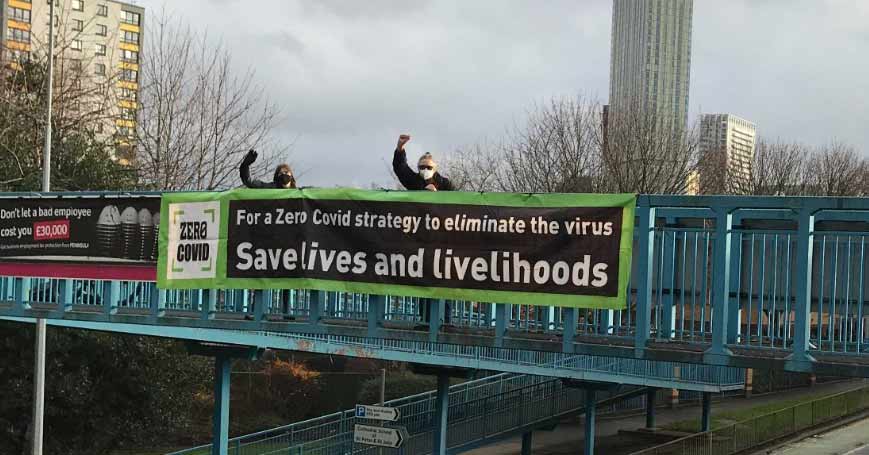

By Rebecca Anderson
Coronavirus cases are surging once again. Cases increased by 75% in the week ending 29 May and eight thousand new cases were reported on 11 June. The Delta variant, which is between 30% and 100% more transmissible than the Kent variant, is now understood to be the dominant strain in the UK. Early evidence also suggests that a single vaccine dose is less effective against the Delta variant than against previous strains.
Leaked reports of plans to delay the “reopening” by four weeks suggests that the government are testing the waters for the public’s reaction – and, more importantly, that of big business.
The service sector, in particular, is warning that their businesses will not survive a delay. The government decided early on to provide only the bare minimum of support for those whose income was to be impacted by the pandemic. Hundreds of thousands were thrown out of work onto Universal Credit, which was only increased by a small amount on a temporary basis. The furlough scheme only covered 80% of wages (due to fall to 70% on 1 July), and small businesses will struggle to extend their credit or pay back their loans. A longer lockdown, without government support for those who need it, will inevitably reverberate through the economy.
Once again, lives are being weighed against profits. Dr Mike Tildesley, a member of the government’s advisory panel, the scientific pandemic influenza modelling group, told the BBC:
“If we show that cases may rise – and of course, hospital admissions and deaths may rise over the coming months – what kind of rise in those can the government cope with to allow society to reopen?”
The government has posed this trade-off between lives or livelihoods, between financial ruin and the risk of death or serious illness, as unavoidable. It has positioned itself as an adjudicator, above the debate, but we must demand a third solution of the government: tax the rich to save lives and livelihoods.
To take one example, only half of symptomatic adults self-isolate, and those on lower wages are least likely to do so. However, where financial support to isolate is available, for example in Finland where 100% of wages are paid, compliance is far higher. Of all the failings of the test and trace system, the failure to support people to isolate and prevent the spread of the virus is perhaps the worst. A coronavirus wealth levy on those who have profited from the pandemic could pay for measures such as unemployment benefits, furlough and self-isolation payments at 100% of wages, and allow effective lockdowns that successfully reduce Covid cases to zero.
Throughout the pandemic, the government has delayed necessary measures like school closures, lockdowns and social distancing for fear of the economic damage. These decisions caused the UK to have one of the highest coronavirus death rates in the world. Furthermore, they turned the UK into a petri dish for virus mutations, leading to the Alpha (Kent) variant, which caused many more deaths across the world.
We are now just a week away from 21 June, the date when life is supposed to return to “normal”. Under the existing social distancing measures, cases are already rapidly increasing. A month’s delay may do nothing but maintain the current rate of spread. Both this growth in cases, and modelling into the future, suggests that the vaccine rollout is not enough to create “herd immunity”. Currently, 6% of those hospitalised have had both doses of the vaccine and only half of the population has received two doses of the vaccine. And the more the vaccine spreads, the greater the risk of vaccine-resistant strains. Ending all social distancing measures, whether in June or July, will surely guarantee a third wave.
While ordinary people imagine a return to life as “normal” to mean social interaction without masks, distancing and fear, the government has a different agenda. On 31st May, the eviction ban was lifted, and housing charities warned that 400,000 people now face eviction. This is the tip of the iceberg, with furlough payments due to end in September and the Universal Credit uplift of £20 per week set to end before the winter. The government’s drive to return to “normal” means pulling the rug out from under our feet.
There were already the beginnings of a recession when the pandemic hit and it has been deepened by the economic havoc wrought by coronavirus. Fighting now for a coronavirus wealth levy as part of a zero covid strategy to save jobs and lives, combined with a mass anti-eviction movement, would prepare us for the struggles to come against the inevitable job losses and benefit cuts in the autumn and winter.
The government and the bosses will do all they can to force the working class to pay the cost of that economic crisis. Against threats of redundancies, we must demand nationalisation, under workers’ control and without compensation paid to the bosses. To resist the benefit cuts and fight for benefits at 100% of wages we need to build an unemployed workers’ movement. To fight back against the coming attacks on the working class, on our jobs, our public services, our standard of living, we need to build councils of action to link our struggles together and fight for socialism.